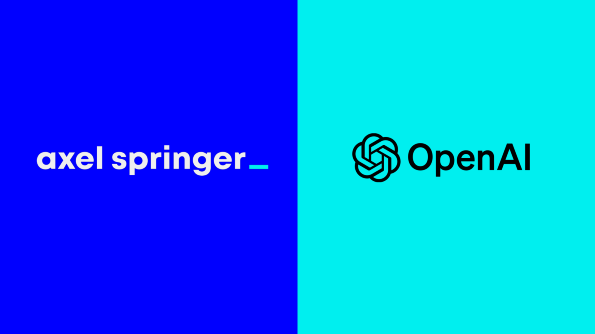ChatGPT: OpenAI, Axel Springer reach landmark deal
Global news publisher Axel Springer and OpenAI, the company behind the ChatGPT chatbot, have announced a landmark deal. Summaries of Axel Springer content will be delivered in response to ChatGPT queries.
As part of the deal, when users ask ChatGPT a question, the chatbot will deliver summaries of relevant news stories from Axel Springer brands, including Politico, Business Insider, Bild and Welt.
Those summaries will include material from stories that would otherwise require subscriptions to read. The summaries will cite the Axel Springer publication as the source and also provide a link to the full article it summarizes.
The summaries will be available on ChatGPT as soon as the article has been published, so that breaking news is part of the user experience, according to Tom Rubin, OpenAI’s head of intellectual property and content. The Axel Springer content will begin appearing in the first quarter of 2024, Rubin said.
The content will get a “favorable position” in ChatGPT search results, with the goal of helping to drive traffic and subscription revenue to Axel Springer brands, according to a source familiar with the deal.
OpenAI will also pay for the Axel Springer content it uses to train the large language models that power ChatGPT. That content includes archived material, Rubin said.
The companies did not disclose the financial terms of the deal, which is for multiple years and is not exclusive, according to Rubin.
“We want to explore the opportunities of AI empowered journalism—to bring quality, societal relevance and the business model of journalism to the next level,” said Axel Springer Chief Executive Mathias Doepfner in a statement.
Also Read: OpenAI delays launch of custom GPT store
The deal comes as publishers contemplate suing technology companies for violating their copyrights by using, without permission, their content to train large language models. In addition to striking deals with AI companies, they are threatening litigation over the possibility of copyright infringement and demanding to be compensated for the content used to train AI models.
AI companies, for their part, benefit from training their models on accurate, recent information, making news content a desirable source of training data. AI systems such as ChatGPT have dazzled consumers and businesses with their ability to plan vacations, summarize legal documents, and write computer code.
The Axel Springer deal is the second between OpenAI and a major news publisher. In July OpenAI struck a deal with the Associated Press, in which the AP is licensing part of its archive of news stories to the Microsoft-backed tech company. The AP will gain access to OpenAI’s technology and product expertise as part of the deal, for which financial details were not disclosed. The AP deal “wasn’t about display of content,” said Rubin.
Other deals may soon follow. In November, News Corp. chief executive Robert Thomson said the company was in “advanced discussions” to strike deals on the use of its content for generative AI.
News publishers have been slow to adopt generative AI technology over concerns about its tendency to generate factually incorrect information as well as challenges in differentiating between content produced by humans and computer programs.


